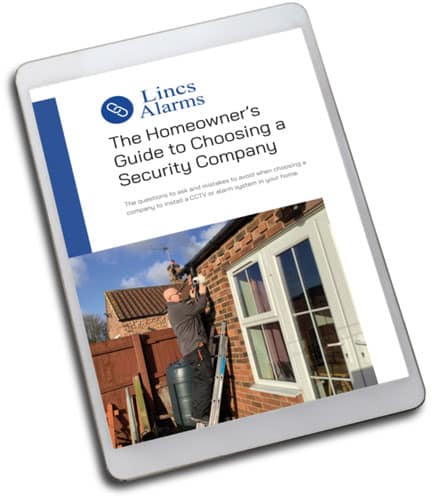Wired. Vs Wireless Home Alarms: Pros, Cons & Costs
A home alarm is your first line of defence against burglars, break-ins and criminal activity. These are one of the most popular forms of home security and a great way to ensure peace of mind, whether you’re home or away, and can be used in all kinds of properties.
Not only are they a reliable way to highlight any issues, but home alarms can also be effective deterrents. They can provide multiple levels of protection to your home, loved ones and most valued possessions – as long as you choose the best one for your property.
Homeowners have two main options when it comes to home alarms: wired or wireless. Both of these systems offer their own pros and cons, which we will explore in this post. As a leading security provider, Lincs Alarms understands home alarms well and knows the main concerns most homeowners have when it comes to their safety.
Using this experience, we are comparing both wired and wireless home alarms to help you make the right decision for your household.
What Are The Different Kinds Of Home Alarms?
Homeowners have a choice when it comes to burglar alarms – wired or wireless systems. These are the two main categories for burglar alarms these days, and determining which is the best one for your needs requires some serious consideration.
Wired Home Alarms
Wired home alarms are the traditional option for home security, as these are the kind of models that have been around the longest. These kinds of home alarms rely on physical cables to connect sensors, sirens and the main control panel.
Wireless Home Alarms
Relying on modern technology such as WifI, Bluetooth or radio signals, wireless home alarms do not have physical cables. The connections between the control panel and each part of the alarm are made through these invisible signals, as opposed to cables and wires.
Both forms of home alarms can provide excellent levels of security to your property, but the installation, maintenance and control programs of each can make them better suited to different requirements.
Wired Home Alarms: Pros and Cons
Wired home alarms are the traditional option and can be extremely beneficial for a range of properties. These kinds of alarms have been trusted for decades and continue to be a great solution for some homeowners due to their reliability. However, as they rely on various cables and physical wires, the installation process can be more complex.
Pros
- Reliable: Wired home alarms have been used as a security tool for decades because they are so reliable, and this continues to be a major appeal for modern homeowners. As they are wired and professionally installed, these home alarms are less prone to power outages and signal interference, providing lasting protection to your home.
- Long-Lasting Power: As these are wired systems, there is no need for frequent battery changes. Instead, the power comes from the mains supply and is continuous, ensuring your home alarm is always ready to protect your property and loved ones.
- Ideal For Large Homes: Wired home alarms can provide far-reaching protection, as multiple sensors and sirens can be connected to one main control panel. This makes them a great solution for large properties and coverage in multiple rooms.
Cons
- Complex Installation: Wired home alarms have a complex installation process due to the multiple cables and wires. This requires professional help and can be disruptive to your home, based on the scale of the property and the kind of alarm system you choose.
- High Upfront Costs: Due to the need for professional installation, wired home alarms have a high upfront cost – especially when compared to wireless systems. When choosing wired home alarms, you are not only paying for the system itself but also the installation process, which includes materials and labour fees.
Wireless Home Alarms: Pros and Cons
Wireless home alarms are incredibly popular with modern homeowners because of their flexibility and ease of use. Unlike traditional home alarm systems, wireless alarms can be easy to install and just as effective. However, due to the fact that they are often installed independently, wireless home alarms can have higher maintenance fees over time.
Pros
- Easy Installation: One of the biggest appeals of wireless home alarms is their easy installation process. As they rely on signals, there is no need for wires and cables, meaning the installation is quick and hassle-free. This process can be done with the support of professionals or independently, due to how easy it is.
- Flexible Protection: Without wires, these home alarms are not tied to a specific area and can be moved around the home to help you keep track of your safety from all angles. They can be adjusted to suit your needs and are easy to move with you if you decide to sell up.
- Smart Home Integration: By using Wifi or Bluetooth signals, wireless home alarms can be integrated with other home technology devices for easier controls and better protection. For example, it is common for homeowners to integrate their wireless alarms with CCTV cameras.
Cons
- Possible Interference: Wifi signals can be interrupted or interfered with, which can put your wireless home alarms at risk. This is why effective security software is also required alongside wireless technology, which can contribute to the total cost of these home alarms.
- Higher Maintenance Fees: Although they have a lower installation cost, wireless home alarms can have higher maintenance fees in the long run. From repairs and upgrades to ongoing battery changes, these additional costs need to be considered.
Cost Comparison: Wired vs. Wireless Home Alarms
When it comes to any form of home improvement, even something as essential as home alarms, the cost is often the main concern. How much you are willing to spend and can afford to continue spending on home security is a big deciding factor in finding the ideal solution for you.
While wired home alarms have higher installation costs, as they can average between £500 to £1,500 and beyond based on the scale of your home, they may be more affordable in the long run. Wired systems do require professional installation, which means facing additional charges such as for materials and labour. The process can be more complicated, but wired home alarms are incredibly reliable and require little to no ongoing maintenance.
Wireless home alarms, on the other hand, are incredibly affordable. As they do not necessarily require professional installation, it is possible to set your home up with a wireless system for under £200. Professional installation can make your wireless systems more reliable and long-lasting, but it will increase the price. However, despite the more affordable installation, wireless systems require ongoing maintenance such as software updates, online security, and battery replacements, which can make them more expensive in the long run.
Both wired and wireless home alarms can also come with the additional service of professional monitoring. This will add to your total cost, and is often an ongoing fee, but can provide greater peace of mind.
Wired Vs Wireless: What Is The Best Home Alarm For Me?
Both wired and wireless home alarms offer their own set of pros and cons, which can help you decide on the best choice for you. In our experience as a leading security provider, we’d recommend:
- Wired alarms for large homes, long-term residencies, and reliability
- Wireless home alarms for smaller homes, rentals or short-term residencies, or those who desire flexibility in their home security
To ensure you are making the best choice for your home, consider your budget, home size and future plans. At Lincs Alarms, we supply a range of home alarms and can recommend the best type for your specific needs through our professional consultation. We will install and maintain these alarms to ensure your home remains the safe haven you desire.
Conclusion
There are various choices you can make for home security, with home alarms being one of the most popular. Home alarms come in two main forms, wired or wireless, to accommodate all needs.
Based on the size of your home, your budget and long-term plans, you can find the right home alarm for your needs. Working with professionals such as Lincs Alarms makes it easier for you to protect what is most important, as we offer a range of services to support all needs.
Contact Us Today
To learn more about our services or request a consultation, please contact the team today.
FAQs
Do wireless home alarms work without WiFi?
Yes – most wireless alarms rely on radio signals to connect the sensors to the main control panel. However, wifi is needed for app control and smart features.
Can wired systems be upgraded to smart home technology?
In some cases, yes. Older wired alarms can be integrated with smart home hubs or adapted with add-on devices, but professional installation is needed.
How long do home alarms last?
With the proper installation and maintenance, both wired and wireless home alarms can last between 10 and 15 years.

